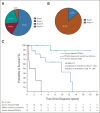The Multicenter Cancer of Pancreas Screening Study: Impact on Stage and Survival
- PMID: 35704792
- PMCID: PMC9553376
- DOI: 10.1200/JCO.22.00298
The Multicenter Cancer of Pancreas Screening Study: Impact on Stage and Survival
Abstract
Purpose: To report pancreas surveillance outcomes of high-risk individuals within the multicenter Cancer of Pancreas Screening-5 (CAPS5) study and to update outcomes of patients enrolled in prior CAPS studies.
Methods: Individuals recommended for pancreas surveillance were prospectively enrolled into one of eight CAPS5 study centers between 2014 and 2021. The primary end point was the stage distribution of pancreatic ductal adenocarcinoma (PDAC) detected (stage I v higher-stage). Overall survival was determined using the Kaplan-Meier method.
Results: Of 1,461 high-risk individuals enrolled into CAPS5, 48.5% had a pathogenic variant in a PDAC-susceptibility gene. Ten patients were diagnosed with PDAC, one of whom was diagnosed with metastatic PDAC 4 years after dropping out of surveillance. Of the remaining nine, seven (77.8%) had a stage I PDAC (by surgical pathology) detected during surveillance; one had stage II, and one had stage III disease. Seven of these nine patients with PDAC were alive after a median follow-up of 2.6 years. Eight additional patients underwent surgical resection for worrisome lesions; three had high-grade and five had low-grade dysplasia in their resected specimens. In the entire CAPS cohort (CAPS1-5 studies, 1,731 patients), 26 PDAC cases have been diagnosed, 19 within surveillance, 57.9% of whom had stage I and 5.2% had stage IV disease. By contrast, six of the seven PDACs (85.7%) detected outside surveillance were stage IV. Five-year survival to date of the patients with a screen-detected PDAC is 73.3%, and median overall survival is 9.8 years, compared with 1.5 years for patients diagnosed with PDAC outside surveillance (hazard ratio [95% CI]; 0.13 [0.03 to 0.50], P = .003).
Conclusion: Most pancreatic cancers diagnosed within the CAPS high-risk cohort in the recent years have had stage I disease with long-term survival.
Conflict of interest statement
No other potential conflicts of interest were reported.
Figures




Comment in
-
Building on More Than 20 Years of Progress in Pancreatic Cancer Surveillance for High-Risk Individuals.J Clin Oncol. 2022 Oct 1;40(28):3230-3234. doi: 10.1200/JCO.22.01287. Epub 2022 Jul 21. J Clin Oncol. 2022. PMID: 35862875 No abstract available.
-
Winning the Battle But Losing the War: Single-Cancer Screening Trials.J Clin Oncol. 2023 Feb 10;41(5):1147. doi: 10.1200/JCO.22.01668. Epub 2022 Oct 31. J Clin Oncol. 2023. PMID: 36315928 No abstract available.
References
Publication types
MeSH terms
Grants and funding
LinkOut - more resources
Full Text Sources
Medical
Miscellaneous

